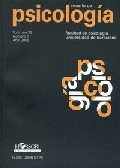Family and childhood antisocial behaviour
Abstract
This study examines the association between family variables andvchildhood antisocial behaviour. Social-demographic variables, marital conflict, family stress, parenting styles, social support, and quality and structure of family environment were studied. The sample consisted of 76 families composed by parents and children aged from 6 to 10 years. Five different types of family structure were considered in the study. Results showed that high level of marital conflict and family stress, authoritarian or permissive parenting practices and large family’s conflictive networks were risk factors for antisocial behaviour. However, antisocial behaviour did not show significant relationship with the size of family’s social support network, the quantity and quality of the stimulation that children received at home, the type of family structure, and socialdemographic variables such as parents´ age or economical and educative level. A multiple regression analysis showed that all family predictors explained about 43% of the variability in childhood antisocial behaviour.Downloads
Published
2010-06-07
Issue
Section
Articles
License
The authors who publish in this journal agree to the following terms:
Authors transfer to the publisher all copyright for the full term of protection and for all the world.
The authors can post a copy of their articles in accordance with the policy of free access to the journal.


